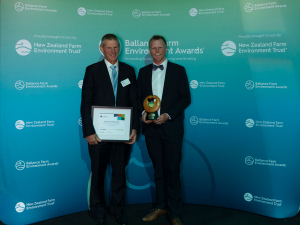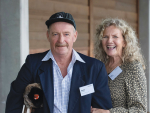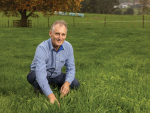Ashburton father and son, Phillip and Paul Everest have been named as the new National Ambassadors for Sustainable Farming and Growing and the recipients of the Gordon Stephenson Trophy.
The announcement was made earlier this week at the National Sustainability Showcase at Te Pae in Christchurch.
The event was attended by all the regional supreme winners from the 2022 Ballance Farm Environment Awards (BFEA). The BFEA is an annual celebration and promotion of sustainable farming and growing practices hosted by the New Zealand Environment Farm Trust (NZEFT) where regional supreme winners come together to share ideas and information.
The Everest family run Flemington Farm in Ashburton where they’ve expanded the255ha property into a sustainable dairy and beef farm. They were named the 2022 Regional Supreme winners in the Canterbury Ballance Farm Environment awards in July this year.
Having owned Flemington Farm since 1989, they introduced dairy into the mix in 2010 and currently milk 750 cows on a predominantly pasture-based system. When they set up the milking platform that year, the best technology of the day was incorporated, as the Everests were committed to investing in looking after their labour and the environment.
“Phillip and Paul combined their experience and energy to provide clear and informative responses addressing the problems facing their business and those of our primary sector,” say the National Judging Panel. “Their understanding of their current GHG emissions and metrics were impressive stepping through their calculations around various scenarios and demonstrating a clear understanding of their requirements and options to address this. Climate change is accepted as mainstream.”
The Everests aimed to have one person in the shed each milking, to minimise water use, and to treat effluent as fertiliser.
Another focus has been to create a good working and home environment for their employees, resulting in a stable workforce that enjoys training and development opportunities.
Environmental sustainability is at the core of how this family runs their business. Among a raft of other initiatives, the Everests have established more than 20km of shelter and riparian plantings – creating a comfortable environment for their animals and enhancing the property’s beauty. They also monitor all their streams on a regular basis.
“For us, the Everest families of Flemington Farm in Canterbury demonstrated their broad and deep understanding of agribusiness in New Zealand through agile and well-informed responses to our questions. This included an open and considered view of what they envision their farm system may look like in 5 – 10 years,” says chair of the National Judging Panel Dianne Kidd.
“We are confident they will be excellent ambassadors for the NZFET.”











